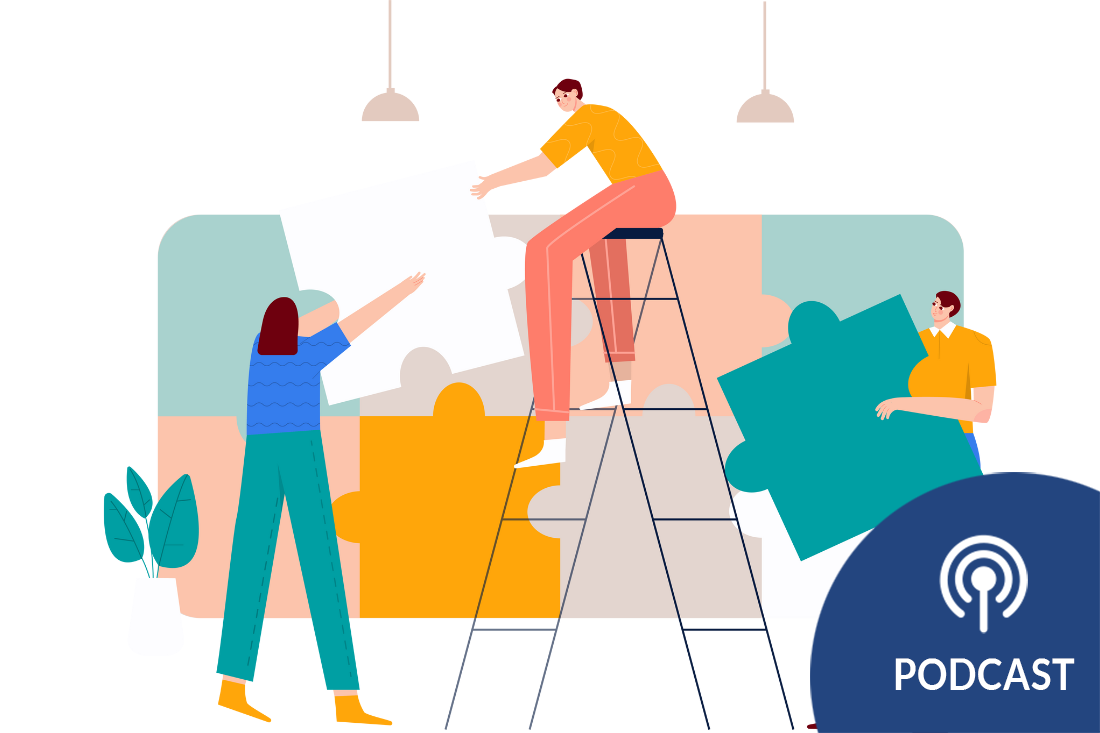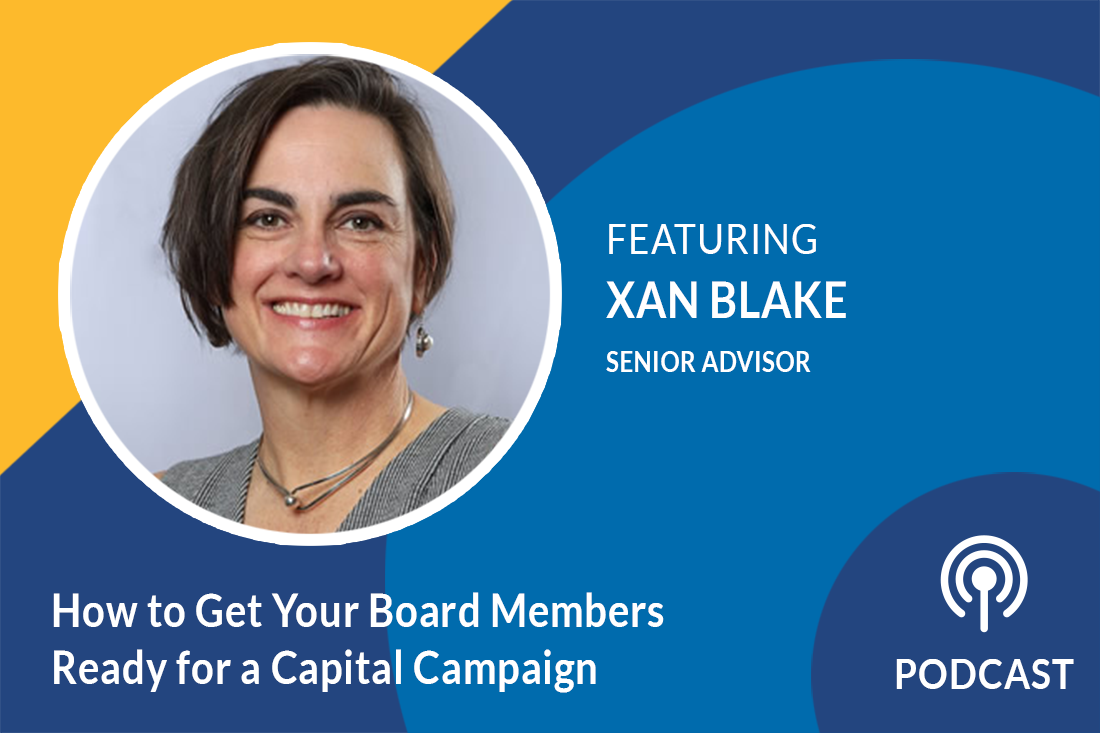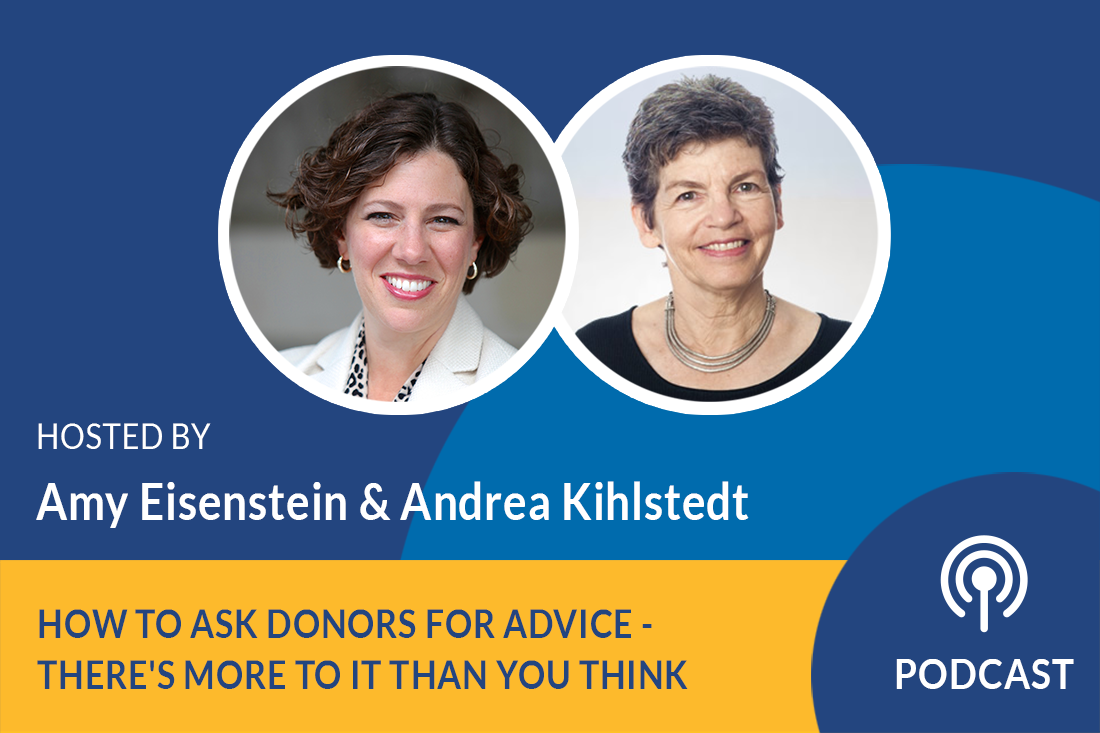Podcast: Amp Up Your Campaign Team with Peer Support

Season 2, Episode 45
Campaign experts Amy Eisenstein and Andrea Kihlstedt discuss the important lessons they’ve learned from leading peer support groups of people conducting capital campaigns.
Listen Now:
This podcast is the first of a special Summer Series of conversations on important fundraising topics. Our live webinars will return on September 12, 2022; learn more at ToolkitTalks.com.
Amy Eisenstein:
Hi, I’m Amy Eisenstein. And I’m here with my co-founder of Capital Campaign Pro, Andrea Kihlstedt. In this podcast, Andrea and I are going to talk with you about a wonderful opportunity you have in a campaign to get the support you need without hiring any additional staff. You’re going to learn four reasons that peer support is crucial for your mental health, and the success of your campaign. Andrea, why don’t you get us started?
The Importance of Peer Support During a Capital Campaign
Andrea Kihlstedt:
Thanks, Amy. It’s a pleasure to be here with you today. Yeah, before we started the Toolkit, I’m not sure I would’ve thought about the importance of peer support, but when Amy and I started the Toolkit, we actually created as a part of the Toolkit membership opportunities for our clients, our members, to come together for weekly calls. And we’ve been doing this for about three years now, and it’s been fascinating to see what’s happened. We have people who don’t miss a call. They just come on every Wednesday. These calls are just free ranging calls.
We have a couple of experts there, but really they’re just free ranging calls where people have a chance to talk about their campaigns and what’s going on, and questions they have that have come up for them. And of course over time, people have gotten to know one another, and they come with questions. So someone will pose a question, “I’m getting ready for the public phase of my campaign. I’m not quite sure whether the time is right. What do you guys think?” And then other people on the call will weigh in. And we’ve learned a lot from watching these groups function.
So, Amy, what do you think is the most important lesson we’ve learned?
Amy Eisenstein:
Yeah. Let me just back up a little bit and say the calls aren’t quite as willy-nilly, as you’re describing. They are facilitated by our expert campaign advisors. So there is some structure, but I think you’re right to say that the point is that attendees come with their questions. These are executive directors and development directors for the most part. And they come with different topics and questions to be discussed and debated by other nonprofit leaders going through campaigns. Now, our experts weigh in of course as well, but I think the most valuable learnings really are from peers. And that’s why we call them peer support groups.
Peer Support as Fundraising Therapy
I often jokingly refer to them as fundraising therapy because honestly, to me, that’s what they are, and that’s why we say that these peer support groups are crucial for mental health, because I think these peer groups really decrease the loneliness and isolation that nonprofit leaders feel when they’re going through campaigns. It is frequently that they feel like they’re the only ones doing this out there. And these weekly peer support groups that we’ve put together for our clients make a huge difference in their excitement, attitude, accountability, all sorts of benefits. What are some other lessons that we’ve learned from running these peer support groups now for a little over three years?
Andrea Kihlstedt:
Yeah. So a number of other things have come to my mind. One is that in the groups we put together, there are people from many different kinds of organizations. So a typical group might have, I don’t know, eight, maybe 10 people in attendance. It varies up and down with the week. But we may have a couple people from a community college. We may have someone from a —
Amy Eisenstein:
Animal shelter.
Andrea Kihlstedt:
… animal shelter or a homeless organization, or we may have someone from a small arts organization all on the same call, big organizations and small organizations. What we find is that that mixture is super helpful. First of all, people don’t worry about sharing information because the people they’re talking to aren’t directly in their market. They’re not the people next door. They’re not directly in their market. So they tend to be comfortable sharing their experience.
And of course it turns out that campaigns, whether you’re doing it for a big college or you’re doing it for a small arts organization, the same questions tend to come up. And when someone poses a question, and hears the responses and the suggestions from people from other organizations, it adds a sort of weight and depth to the responses. I think people are often both surprised by that and delighted that they get a chance to hear what it’s like for other people in other kinds of organizations. So mixing organizations has turned out to be a benefit, not a challenge.
Groups Composed of Like-Minded Peers
Amy Eisenstein:
I think that’s so interesting because often when people start to work with us, they’re interested in having a group that’s just community colleges or just animal shelters, or just K-12 schools. And what we’ve really learned is that there is value in having these groups mixed up. There are some people running campaigns for $3 million and other people running campaigns for $30 million, and others running them for a hundred million dollars. And yet the challenges and the solutions seem to be very much across the board. And I think that you’re right.
It is helpful that people are in different states, in different parts of the country throughout Canada and the US. And that really reduces the fearfulness that somebody will know somebody or that there’s competition. So that’s actually something to think about if you are wanting to create your own peer support group, which you absolutely can do. And we encourage you to think about, if you’re going into a campaign and you’re not one of our clients, you could and should put together a peer support network that you check in with on a regular basis. Now, all right, what else have we learned from our peer support groups?
A Tapestry of Different Experience Levels
Andrea Kihlstedt:
Yeah. So here’s another learning that was really interesting. We have a wide variety of experience level in our groups. Some people have been in this business a long time. The campaign they’re working on now is not their first campaign rodeo. They’ve been doing it a while. And some people on the very same call are really beginners. This is their first campaign. And one might imagine that that’s difficult, but it turns out to be terrific. Not only do the really experienced people enjoy being the experts sometimes, but the new people are delighted that the experienced people sometimes pose the very same questions that they themselves have.
So it is sort of a leveler. The people who come on the calls week after week, gradually become comfortable with one another. They get to know one another. They often share information. They’ll share samples of something. They’ll share a sample letter or a sample report form, or whatever they’re talking about that week, and they’ll share it in the chat. We haven’t mentioned it, but of course, all of these are Zoom-based are virtual. So they’re easy to attend. And, and in the chat people exchange email addresses, or they can drop in an example of something or a link to an example of something.
And I think some of them actually end up having conversations in relationships outside of the calls as well, when it’s going to be useful. So it’s a wonderful way of expanding your network, specifically with people who are doing capital campaigns. It will, as Amy said, lessen the sense of loneliness. And I don’t think we can overstate that. Running a campaign does feel lonely. Even in your own organization, it feels lonely. You may be the only person who really is single-mindedly working on that. And it feels like the stakes are very high and you’ve got no one really kind of on your side. So a peer group makes it feel like you have other people who you can reach out to. That’s just so important. Amy, I don’t know what I do without you.
Amy Eisenstein:
I feel the same way. Let me go back to this idea of having a mix of people with more experience and less experience. Because I think that often, when you’re thinking about putting together a peer support group, you want people at, or above your level, right? Nobody wants to be the most experienced. But what we’ve seen is that when people with less experience ask questions, people with more experience are relieved that they didn’t have to ask those questions because they don’t want to ask what they perceive as an embarrassing question, but somebody else asks it and they’re delighted to have the answer.
And on the flip side, more experienced people ask questions that would never have occurred to less experienced people. So they learn because they hear questions that are asked that they didn’t even, excuse me, know to ask. And so I think it really goes both ways, that it’s beneficial to people with more experience and people with less experience, and it is really… It’s turned out to be such an amazing experience, I think, for us and for our clients, because it’s brought a whole new level of expertise and education and example sharing and peer support to the process that we didn’t even know we were creating when we set these peer support groups up.
Creating a Peer Support Group for Your Campaign
Andrea Kihlstedt:
One of our expert advisors is the main facilitator for a group. And then we have a second sort of support person. I’m Amy and I are often the second support person in that. And I have such a good time. I just so enjoy being part of that process. It feels so healthy and so important. And honestly, the technology today makes it possible for us to be in touch with people across the country, and create these little peer support groups. So whether you’re a member of the Toolkit or not, we encourage you to come to the Wednesday calls, of course. If you’re not a member of the Toolkit, we of course encourage you to become a member.
But if you don’t want to do that, and that’s perfectly fine, we encourage you to think about how you could create a peer support of your own, so that you have the kind of support through your campaign, that we have found has been so useful with our members. Even if you just talk to two or three other people you know in the field who are doing campaigns and say, “Hey, who else do you know, who might be interested? Why don’t we put together a little Zoom meeting and see if we can get this off the ground?” You may be surprised at how easy it is to do that. And with a regular meeting, all of a sudden you have a support group of people that every other week or every week or every month you can go to and let down your hair a little.
Amy Eisenstein:
Yeah.
Andrea Kihlstedt:
It really is more important than you might imagine.
Amy Eisenstein:
And I think it’s interesting because everybody’s so busy and tight for time. And yet to see these nonprofit leaders of some very big and sophisticated and some very small organizations show up week after week, after week, to learn from one another, to commiserate, to bond, to encourage, to motivate, it really is sort of magical. And so we can’t say enough about these peer support groups in terms of benefiting, being beneficial to your campaign. Fundraising can be a very lonely business. And sometimes, we all need a little fundraising therapy. And I think that that’s what these peer support groups, if they’re organized, if they’re regular, you can’t set them up and say, “Oh, nobody can show up. And let’s cancel week after week, after week.” You have to be committed to showing up and coming.
Now, not everybody shows up every week in our format and that’s fine. You show up when you can. But for the people that do, they leave so motivated, so encouraged, so confident that they came with a question or something that was keeping them up at night or baffling them. I think it’s a beautiful thing. All right. Any last words that we want to say about these peer support groups that have added such a dimension to our support system for nonprofit campaigns?
Final Thoughts
Andrea Kihlstedt:
I have learned a great deal from the work you and I have done, Amy, in developing the Toolkit. And this is one of the learnings. This is one of the big learnings, that peer support matters. And with today’s technology, anyone can build a peer support system, and the capital campaign is a good time to do it.
Amy Eisenstein:
Excellent. So I think that the key points are that no matter what kind of organization you are in, people in campaigns across the board have similar questions. Similar questions come up with big organizations, small organizations, regardless of the type. And so it really doesn’t matter what type of organization you are in or the size of your campaign. The questions are consistent. I think it really is super important that you have an opportunity to share and exchange ideas.
And that if you have a peer network of support, it really is going to abate some of the loneliness and some of the isolation that you may feel while you’re fundraising. Andrea, thanks for sharing some of those amazing tips about peer support groups. I think we really learned a lot. For those of you listening, if you want to learn more about our peer support groups, please visit the Capital Campaign Pro website at capitalcampaignpro.com.
And if you need more help, please sign up for a free strategy session, and see if membership is right for you. Thanks for joining us. We’ll see you next week.



Leave a Comment